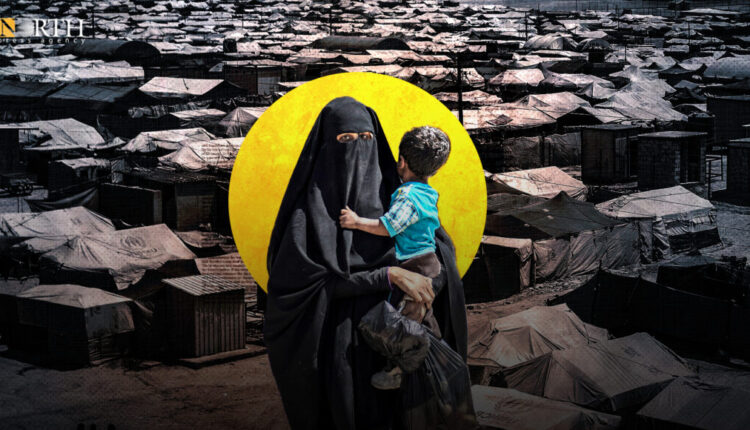
By Robin Omar
QAMISHLI, Syria (North Press) – European countries claim obstacles and many concerns to repatriating their ISIS-affiliated nationals from Hawl and Roj camps in Northeast Syria despite international charters requiring countries to fulfill their responsibility by repatriating their own citizens.
These alleged concerns include security risks associated with radicalization and terrorism, political sensitivities triggering public backlash, legal challenges in finding prosecution evidence, as well as divergent national perspectives on responsibility.
Hawl Camp, located in the southeast of the city of Hasakah, northeast Syria, houses approximately 55,000 individuals of foreign nationalities, including 2,423 families affiliated with ISIS from around 60 countries worldwide, according to official statistics from the camp administration.
Roj camp, in the countryside of Derik (al-Malikiyah) in the far northeast Syria, houses around 3,000 individuals of ISIS affiliated families of foreign nationals, according to the UN, 65 percent of the camp’s population consists of children.
European security concerns
The presence of European ISIS nationals in Hawl and Roj camps poses security challenges to both the camp and the countries of origin. There are concerns that these individuals, if released or able to escape, may pose security threats to their return to Europe, as they have been exposed to extremist ideologies and potentially trained in terrorist activities.
“European countries’ hesitation to repatriate their citizens, particularly women and children from ISIS families, is primarily rooted in major security concerns. The fear stems from the potential exploitation of these individuals by the group to carry out terrorist activities upon their return to their countries of origin,” Zana Omar, a Qamishli-based journalist and terrorism expert told North Press.
The repatriation of individuals linked to ISIS is a politically sensitive issue. Governments often encounter the challenge of striking a balance between public opinion and the potential backlash they may face. Repatriating such individuals can be perceived as a security risk, which could have adverse implications for the ruling governments.
“There are several political reasons behind the reluctance of European countries to repatriate their citizens from Northeast Syria. One of these reasons is that they do not want their electoral arithmetic to be affected within their countries,” Omar said.
European countries face challenges in rehabilitating those children and women. The unfamiliarity of rehabilitation programs in those countries, primarily due to legal reasons, coupled with the significant leeway granted by national laws for their movement, poses a security threat to their societies, according to the terrorism expert.
Repatriating those individuals ultimately poses a much lower risk than leaving them in Northeast Syria. ISIS continues to look for new opportunities to replenish its ranks by trying to free these detained fighters. If they escape, they will pose a threat not only to Northeast Syria and the region, but to the whole world.
In March, Michael Kurilla, Commander of US Central Command (CENTCOM), warned of the danger posed by the detained ISIS individuals in Syria and Iraq, stating that “Between those detained in Syria and Iraq it is a veritable ‘ISIS army in detention’. If freed, this group would pose a great threat regionally and beyond.”
Kurilla emphasized that there are “no military solutions to the issue of these individuals.”
Holding responsibility
Khaled Ibrahim, official at the Foreign Relations Department of the Autonomous Administration of North and East Syria (AANES), explained that there is hesitation from many countries, as some countries refuse to repatriate their nationals, while others request the return of children without their mothers. This hesitation and refusal are attributed to those countries.
In a statement to North Press, Ibrahim expressed his belief that this reluctance “has a security aspect and concerns about the consequences of their repatriation, their prosecution, and investigation. Consequently, these countries may not have the capacity to bear these consequences, and it raises questions about the acceptance of local communities towards these returning individuals who hold extremist ideas.”
The UN had previously stated that countries should take back their citizens unless they have been prosecuted in Syria according to international standards. Many countries, however, hesitate due to concerns about public opinion and legal challenges regarding their citizens who joined the group.
Ibrahim added that the countries’ hesitation is influenced by political, human rights, and legal factors, especially concerning the repatriation of children, their parentage, nationalities, and inter-country disputes.
Addressing the issue requires a comprehensive approach that balances security concerns with the legal and humanitarian obligations towards these individuals. Swift action, collaboration, and coordinated efforts are necessary to mitigate the potential threats while ensuring the safety and security of all involved parties.
“To address these issues, comprehensive solutions and strategic planning are necessary, with shared responsibility instead of leaving the burden solely on the AANES,” the official concluded.
International legal principle
Despite the UN’s repeated appeals and warnings from international organizations about the catastrophic conditions in Hawl camp, the majority of countries persist in refusing to repatriate their nationals and have not responded to the AANES’s call to establish an international court to prosecute the ISIS militants held in its prisons.
Only a few countries have accepted and repatriated individuals from detained ISIS families, while some European countries have chosen to repatriate only a limited number of women and children, as well as, others have opted not to and have instead supported the prosecution of their citizens in the countries where they were captured.
The authorities of the AANES and the US have urged member states of the Global Coalition and Western and Arab governments to repatriate their citizens. However, the majority of countries have declined to do so, citing security reasons or attempting to revoke their citizenship.
Mustafa Muslim, a lawyer, stated that it was supposed for the US-led Global Coalition and the countries involved to form an international court in northeast Syria because the “crimes committed here fall under the principle of territorial jurisdiction, which is a legal principle.”
“Repatriation efforts must navigate complex legal frameworks. International human rights law, domestic legislation, and bilateral agreements between countries should guide the process,” Muslim concluded.
